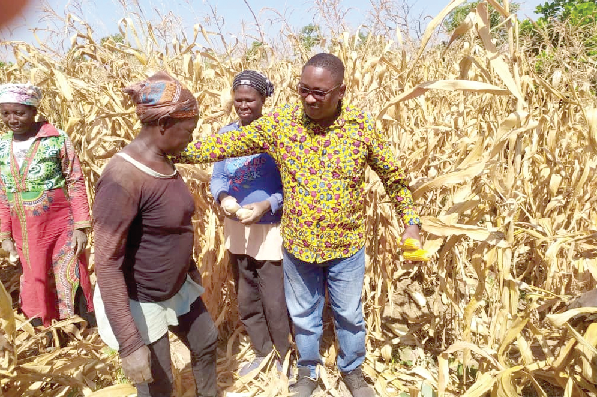
Ensuring food security -Smallholder farmers hold key
Food security is a national security issue and that is why any discussion, decision or directive towards ensuring that there is enough food to feed the population is worth supporting.
In Ghana, one group of people that ensures food availability and security yet is engulfed in a myriad of problems is the smallholder farmer.
Advertisement
Currently, the smallholder farmer produces about 90 per cent of the staple food we consume, implying that they are the main actors in maintaining food security in the country.
Challenges
Therefore, any investment in the food value chains of the smallholder farmer will cascade greatly in supporting the food system in Ghana.
However, by the nature of their production systems and geographical locations, they are faced with some enormous challenges.
These include: low productivity and production, inadequate market access, insufficient rural infrastructure, limited and slow inclusion of women and youth in agricultural value chains and limited extension services.
Role of GASIP
The smallholder farmer can be competitive at any level provided the necessary measures are put in place, and that is why the support by the Ghana Agricultural Sector Investment Programme (GASIP) is timely.
The GASIP is designed to address the problems of the smallholder farmer by leveraging on the private sector in making the smallholder farmer competitive by increasing their efficiency and resilience to climate change through the provision of appropriate technologies, rural infrastructure and equal participation of women and youth.
For the past two years, the success story of GASIP under the current leadership is one that gives testimony that if a task is entrusted to responsible and committed people, it is carried out to perfection.
Non-performing to performing
And so, GASIP, which was until 2019 grounding to a halt and premature closure because of poor implementation and execution, has now been rated as a performing project by the International Fund for Agricultural Development (IFAD), financiers of the project, because of the confidence management has brought to the project.
As of April 2019, when the current management took over the affairs of the project, GASIP implementation status was 12 per cent, giving the financiers the unpleasant duty of rating it as a non-performing programme and threatening to end the project.
However, by October 2020, implementation status of the project had increased to 76 per cent. Management did this by supporting the smallholder farmers. GASIP created shared values and opportunities within the value chains of rice, maize, soya and vegetables. More importantly, GASIP invested in capacity building and training.
Support
Over the last two years, GASIP successfully partnered with 80 agribusinesses (processors, aggregators, etc), to provide market access to smallholder farmers, subscribing them to receive market price information from the Ghana Commodity Exchange.
Within the period, it has supported 90,000 smallholder farmers in 1,200 FBOs with production inputs, training in good agricultural practices, climate change resilience, food safety and quality, operational excellence, food processing, among others.
Additionally, 28 tractors, 600 power tillers and hand-held rice harvesters were given to selected smallholder farmer organisations to boost food production.
GASIP investment
Addressing a stakeholders encounter at the project office, the National Coordinator of GASIP, Mr Klutse Kudomor, said the programme had invested heavily in rural infrastructure.
He said access roads were provided to link farmers to markets and solar-powered boreholes provided to 27 communities for dry season vegetable production.
“Additionally, 12 weather stations have been installed to provide accurate and timely weather information for the farmers and has demonstrated various Climate Smart Agricultural (CSA) technologies to smallholder farmers nationwide.
“We are currently developing 560-hactare irrigation fields for rice production,” the National Coordinator explained.
He explained that those were done through the establishment and training of farmers in 66 conservation agriculture demonstration fields, training of district staff, sensitising the media and agribusinesses.
Mr Kudomor said it was important to emphasise that those accomplishments led to achieving an implementation status of 78 per cent at the end of 2020, adding that the performance led IFAD’s reclassification of GASIP from a non- performing to a performing programme.



